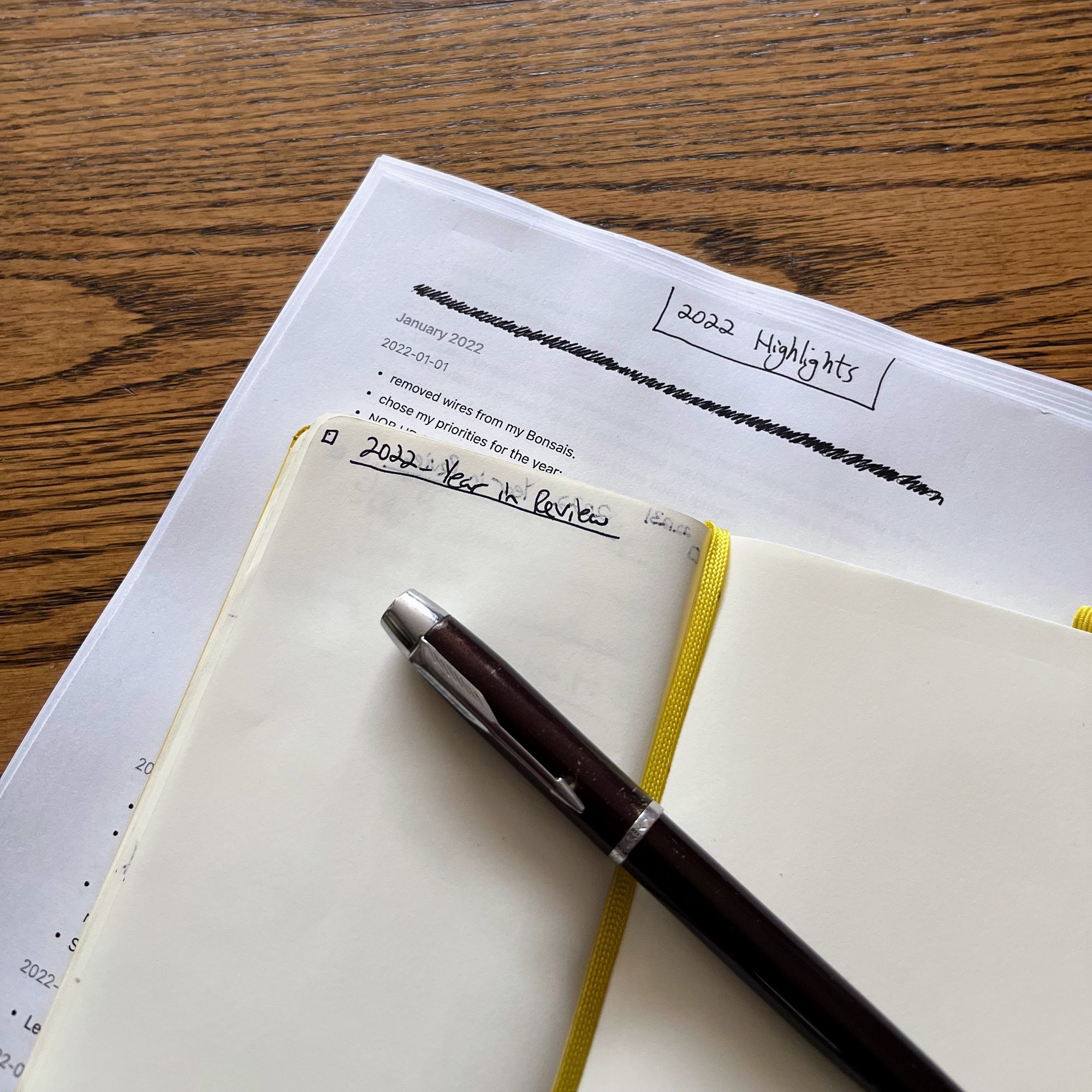How to make the most of 2023

Happy New Year! 🎉
It's that time where we discard the past and make resolutions for the future. Like many people, I've given up on New Year's resolutions. The vast majority of us set resolutions and then give up a few short weeks later. I have countless "before" photos of my torso, arms pulled tight next to me, blips of biceps peeking through my skin. Testaments to the many years I never produced an "after" photo despite telling myself over and over again: "this year will be different."
It was never different. Something needed to change.
Three years ago I decided to try something else. Instead of "resolving" to change A, B or C, I would look at my past year and learn what I could from it, and then use this learning to inform my future behaviours. Very simple, yet powerfully effective.
The last three years have been the most productive and fulfilling of my life. Yes, I had my fair share of pain and discomfort, but with that came growth. Plenty of it. I even have an after photo(!)
My system has evolved, as I have, and will continue to evolve, as I will. I'd like to share my 3-Step annual review process with you, Dear Reader. Feel free to work with it as you see fit.
Absorb what is useful, discard what is useless and add what is specifically your own. (Bruce Lee)
Step 1: Learn from the Past
I am an obsessive note-taker and prolific journaller. I keep a log of my day: things I've done, people I've engaged with, thoughts I've had. One of the most valuable notes I keep in my notebook is my Life Highlights.
Here, at the end of each day, I list key moments of the day. The good things, the painful things. If it is noteworthy, or something I'd like my future self to reflect on, I add it.
If you are not already capturing the highlights of your day at the end of each day, I strongly recommend you do it. This step alone is transformative.
During the year-end transition I print out my highlights since 1 January, find a comfortable spot to sit in and begin reading through them. I do this with a pen, making notes and observations as I go along. I recommend doing this analogue. Your mind processes information differently if pen and paper is involved and besides, we could all do with less screen time.
While reviewing my past, I ask myself a few key questions, such as:
- what new things have I learned?
- have I made progress on my goals?
- how have my habits improved or declined?
- have I been a better person to myself and others?
Because we are all different, you can ask however many questions you'd like. Perhaps you need more detail than I do. There is no right or wrong way to do this. For me, the essential question I need an answer for is: have I gotten better, or worse?
A lot of things happen to us, and around us, in one year. In all this, all we can control is what we do and what we think. When looking back on our lives, our progress, our conduct, our thoughts, we have evidence of our growth. This is empowering, and it can strengthen our resolve for the next year.
Step 2: Plan for the Future
Once I've reviewed my past, I am in a much better position to know what I need to prioritise in the next year.
Im my Future Planning session, I answer three key questions:
1) Who do I want to be?
Here I am talking about your identity, your ideal future self. What kind of person do you aspire to be? It doesn't matter how grand your vision is for yourself. With enough time and focused, consistent effort, any one of us can become whoever we want to be.
Personally, my long-term vision for myself is to (a) be a writer and (b) be a successful life coach. I believe I am here to transform people's lives for the better, inspiring them to be the best they can be. These two goals are best aligned with my personality and interests, and they complement each other well. When I think of the two times I am most alive, it is when I am writing and when I am helping people, so these goals made sense.
You may not have an answer to this question immediately. That's OK. It's taken me years, and much trial and error, to figure this out for myself. Take your time, and don't get frustrated if you don't have an answer yet. It will come.
Just be patient and trust yourself.
2) What are the habits I need to develop?
Habit change isn't a once-off event. It is ongoing. It is a lifestyle. We will not change our habits solely because we've now decided to do it (remember the failure of New Year's Resolutions?). We change our habits by taking small steps in the direction we want to go. Crawl before we walk. Walk before we run.
I am constantly working on the key habits I need to change and new ones I need to develop to be the ideal future self I'd like to be. In fact, I don't wait until the new year to do this. I get started as soon as I've made the decision to change.
So, the end of year review, for me, is simply a check-in to assess whether my current habits are facilitating - or impeding - my growth. If they are working for me then great, they can stay. If they are not, then they must go.
Habits are foundational, and will determine whether or not we are the kind of person who will actually achieve the goals we set out for ourselves.
3) What are my goals for the next year?
Once I am clear on my habits, I review my goals.
A few years back I would have a long list of goals for the year filled with all the things I would do, all the experiences I would have. Inevitably, I would achieve a fraction of them. As you will have seen when reviewing the past, a lot happens in one year, but unless we are crystal clear on the few goals that are actually important to us, and keep them front and centre, it is easy to get sidetracked.
Now, I have 5 to 7 goals for the year. That's it. These centre around what I want to achieve for or with my family, my goals for work, what new skill or knowledge I'd like to learn and what I want to achieve for my health and fitness. I keep my focus narrow on purpose. This mitigates against distraction and keeps me on target. If something comes up throughout the year that doesn't help me move forward on any of my chosen goals, I say no. Will I miss out on a New Cool Thing? Yes. But if I keep changing my mind whenever some New Cool Thing comes up, I will never achieve anything. That's why I am in my mid-thirties and have only now started my blog. I kept getting distracted. No more.
An easy way to decide on the goals that you want to achieve in the next year is to look at the person you want to be, the difference you want to make, the experiences you want to have and the knowledge you want to gain.
Once you know what the broader goals (or projects, if you prefer) for the next year are, break them down into smaller parts. We may have large goals like "change my career" or "publish a book" or "travel the world". These can get overwhelming (and thus discarded) unless we have a clear roadmap on how to actually get there. Look at the broad goals, then consider the individual steps you would need to take to achieve it. Then, break those steps into even smaller steps, until your first step is so easy it would be ridiculous not to do it.
Step 3: Choose Your Theme
The final part of my review is where I decide on a theme for the next year. I have chosen a theme each year for the last three years. Having a theme reminds us of what is important to us in the next year.
2019 was my Year of Discipline, and keeping discipline in mind throughout the year helped me shed many of the poor habits that weren't serving me and replacing them with constructive habits.
This year, I have chosen Exponential Growth. I am hungry to learn, and to grow, and to see who I can become by the end of the year. Keeping this theme in mind will help align me whenever I feel myself going astray. It will do the same for you.
Have a wonderful 2023, Dear Reader.
I look forward to seeing who you become.
Ric.
